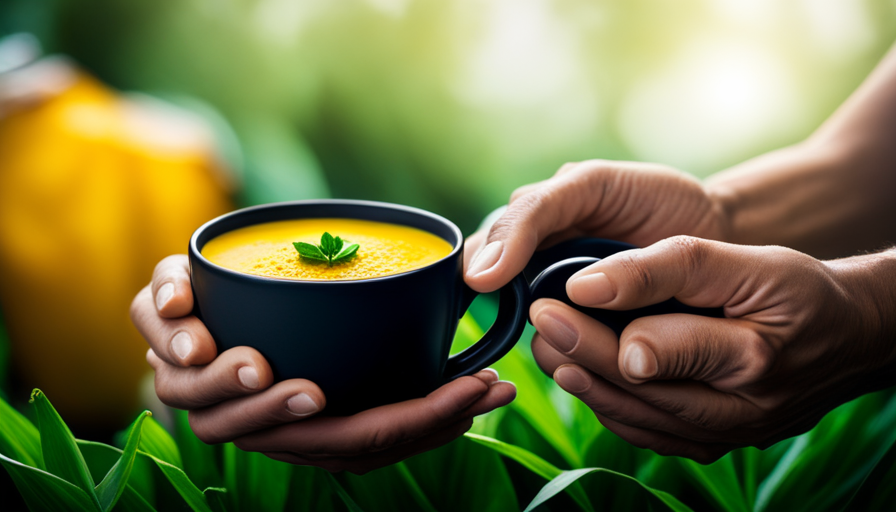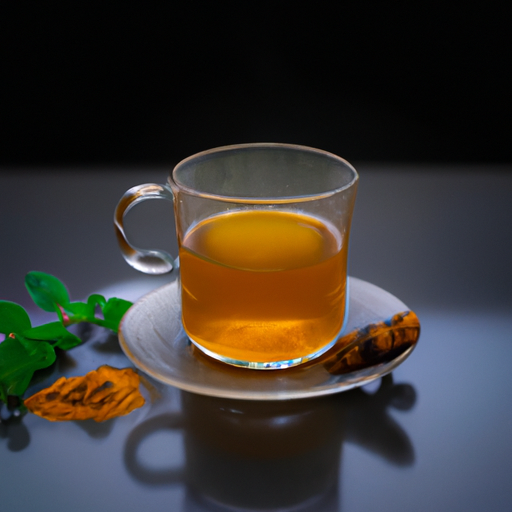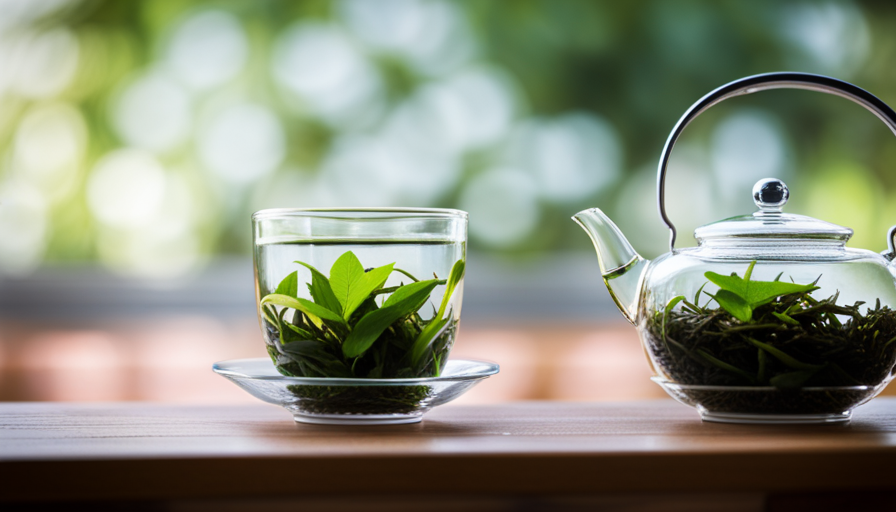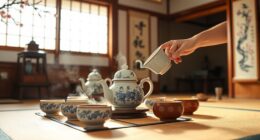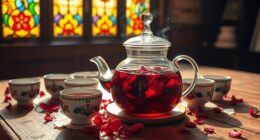As a new mom, I know how crucial it is to stay healthy while breastfeeding. One common concern is whether it’s safe to drink tea while nursing.
With so many different types of tea on the market, it can be challenging to know which ones are safe and which ones should be avoided. In this article, I will provide evidence-based information on what tea is safe while breastfeeding, the impact of caffeine on breastfeeding mothers and infants, and the benefits of drinking tea while breastfeeding.
As a breastfeeding mother, it is crucial to understand the potential risks associated with consuming certain types of tea. While some teas are safe and even beneficial for breastfeeding mothers, others can have adverse effects on both the mother and infant.
By understanding which teas are safe and which ones should be avoided, you can make informed decisions about what to drink while breastfeeding. So, whether you’re a tea lover or just looking for a warm and comforting drink, let’s dive into the world of tea and breastfeeding.
Key Takeaways
- Certain types of tea can pose risks to breastfeeding mothers and infants, so it is important to consume safe types of tea while breastfeeding.
- Decaffeinated tea is a good option for nursing mothers, as excessive caffeine consumption can have negative effects on both the mother and the baby.
- Herbal teas can have a range of health benefits, but some should be avoided while breastfeeding. It is important to consult with a healthcare provider before adding new herbs or supplements to tea.
- Moderation is key when consuming any food or drink while breastfeeding, and paying attention to how the body and baby react to certain foods and drinks is crucial for ensuring their safety.
Understanding the Importance of Safe Tea Consumption while Breastfeeding
As a breastfeeding mother, it’s crucial to understand why safe tea consumption matters for both you and your little one.
First, it’s important to stay hydrated to ensure a healthy milk supply and to prevent dehydration. Drinking plenty of fluids, including tea, can help maintain adequate hydration levels.
However, not all teas are safe for breastfeeding mothers and their infants.
One potential risk of tea consumption is caffeine. Caffeine is found in many teas, and it can be harmful to infants, as it can cause irritability, insomnia, and even dehydration.
Furthermore, caffeine can also affect the breastfeeding mother, causing her to feel jittery or anxious and potentially impacting her milk supply.
Therefore, it’s important to choose teas that are caffeine-free or low in caffeine to reduce the risk of negative effects.
Transitioning into the subsequent section, we will explore the impact of caffeine on breastfeeding mothers and infants.
The Impact of Caffeine on Breastfeeding Mothers and Infants
Caffeine can affect both mothers and infants during nursing, so it’s important to monitor intake. Breastfeeding mothers should be aware of their caffeine sensitivity and limit their daily intake to 300 milligrams or less.
This is because caffeine can pass through breast milk and affect the infant’s sleep patterns. Studies have shown that infants whose mothers consumed high amounts of caffeine had shorter sleep durations and took longer to fall asleep.
It’s important to note that caffeine affects each person differently, so it’s important for breastfeeding mothers to pay attention to how their infants react to their caffeine consumption. If a mother notices that her infant is becoming fussy or having trouble sleeping, it may be beneficial to reduce or eliminate caffeine from her diet.
With that being said, there are still many types of tea that are safe for breastfeeding mothers to consume.
Types of Tea Safe for Breastfeeding Mothers
When it comes to drinking tea while breastfeeding, there are a few types of tea that are safe to consume. As a nursing mother, I’ve found that herbal teas with no caffeine are a great option.
Black tea and green tea are also safe to drink in moderation, as long as they’re not consumed in excess. Lastly, decaffeinated tea can be a good alternative for those who want to avoid caffeine altogether.
It’s important to always consult with a healthcare provider before introducing any new foods or beverages into your diet while breastfeeding.
Herbal Teas with No Caffeine
If you’re looking for a safe herbal tea to drink while breastfeeding, you’ll be pleased to know that there are plenty of caffeine-free options available. Herbal teas have been known to offer various health benefits, such as reducing stress and improving sleep quality. Additionally, brewing techniques can also impact the flavor and health benefits of the tea.
To help you navigate the world of herbal teas, here’s a table of some popular options that are safe for breastfeeding mothers:
| Herbal Tea | Health Benefits | Brewing Technique |
|---|---|---|
| Chamomile | Calming, aids digestion | Steep for 5-10 minutes |
| Peppermint | Eases nausea, relieves tension headaches | Steep for 3-5 minutes |
| Ginger | Reduces inflammation, boosts immune system | Steep for 8-10 minutes |
| Rooibos | Rich in antioxidants, aids digestion | Steep for 5-7 minutes |
| Lemon Balm | Reduces anxiety, improves sleep quality | Steep for 5-7 minutes |
Remember to always consult with your healthcare provider before trying any new herbal tea. While herbal teas are generally safe, some people may have allergic reactions or experience side effects.
While herbal teas are a great caffeine-free option, it’s important to note that black tea and green tea can also be consumed in moderation while breastfeeding. In the next section, we’ll explore these options and their benefits.
Black Tea and Green Tea in Moderation
So you’re feeling a bit adventurous and want to indulge in a little bit of a pick-me-up? Well, lucky for you, black tea and green tea can be enjoyed in moderation while nursing.
Both black tea and green tea contain caffeine, but in much smaller amounts than coffee. While caffeine does pass into breast milk, the amount is usually not significant enough to affect your baby’s sleep or behavior. However, it’s important to remember that moderation in consumption is key. Drinking too much caffeine can lead to potential side effects like restlessness, irritability, and difficulty sleeping in your baby.
If you do choose to drink black or green tea while nursing, it’s important to be mindful of your caffeine intake from other sources as well. It’s recommended that breastfeeding mothers consume no more than 300 milligrams of caffeine per day, which is roughly equivalent to two cups of coffee.
Additionally, be aware that some black and green teas may contain added herbs or flavors that may not be safe for breastfeeding mothers. As always, it’s best to consult with your healthcare provider before making any significant changes to your diet while breastfeeding.
Next, let’s discuss the benefits of decaffeinated tea for nursing mothers.
Decaffeinated Tea
Indulging in a warm, comforting cup of decaf can be a great alternative for nursing mothers who want to enjoy a soothing beverage without the worry of consuming too much caffeine. Decaffeinated tea offers numerous benefits to breastfeeding mothers such as reducing stress levels, promoting relaxation, and aiding in digestion.
Here are some brewing tips to ensure that your decaf tea is just as enjoyable as its caffeinated counterpart:
- Use fresh, filtered water to brew your tea.
- Steep your tea for the recommended time to bring out the full flavor.
- Black tea: 3-5 minutes
- Green tea: 1-3 minutes
If you’re looking for alternative tea options for breastfeeding, decaf tea is a great choice. However, it’s important to note that while decaf tea does contain less caffeine than regular tea, it still contains a small amount. It’s important to consume in moderation and consult with your healthcare provider.
Moving onto the next section, let’s explore the benefits of drinking tea while breastfeeding.
Benefits of Drinking Tea while Breastfeeding
As a breastfeeding mother, I’ve found that drinking tea has been incredibly beneficial for me in a few different ways.
Firstly, tea helps keep me hydrated, which is crucial for milk production.
Additionally, the act of sitting down to enjoy a cup of tea can be relaxing and help reduce stress, which is important for both me and my baby.
Finally, certain teas have been shown to support lactation, which can help ensure that my baby is getting enough milk.
Hydration
Quenching your thirst is crucial when it comes to breastfeeding. Staying hydrated while breastfeeding is essential for maintaining milk supply and helping your body recover after giving birth. Drinking plenty of fluids, such as water and safe teas like peppermint or ginger, can help you stay hydrated.
Dehydration can lead to a decrease in milk supply, making it challenging for your baby to get the nutrients they need. Additionally, dehydration can cause headaches, fatigue, and dizziness, making it difficult for you to care for your little one. So, make sure to drink plenty of fluids to stay hydrated while breastfeeding.
Now, moving on to the next topic, drinking tea can also help with relaxation and stress reduction.
Relaxation and Stress Reduction
It’s important to take time for myself and relax as much as possible, especially when I’m breastfeeding. Breastfeeding can be stressful and tiring, so finding ways to reduce stress and promote relaxation can help improve my overall well-being.
Here are some relaxation techniques and stress management strategies that I’ve found helpful:
- Deep breathing exercises: Taking slow, deep breaths can help calm my mind and reduce stress.
- Meditation: Spending just a few minutes each day in quiet reflection can help me feel more centered and focused.
- Yoga: Gentle yoga poses can help ease tension in my body and promote relaxation.
- Self-care: Making time for activities that I enjoy, like reading a book, taking a bath, or going for a walk, can help me feel more relaxed and rejuvenated.
By incorporating these techniques into my daily routine, I’m better able to manage stress and promote relaxation while breastfeeding. This not only benefits my own well-being, but it can also help improve the quality of my breast milk and promote a better breastfeeding experience for both myself and my baby.
Transitioning to the next section on lactation support, it’s important to remember that taking care of myself and seeking support when needed can help ensure a successful breastfeeding journey.
Lactation Support
Lactation support is crucial for breastfeeding success, and seeking support from a certified lactation consultant can be a game-changer for new moms.
Breastfeeding nutrition plays a significant role in milk production, and it’s important to consume a well-balanced diet that includes plenty of protein, healthy fats, and complex carbohydrates. Additionally, staying hydrated is essential for milk production, so drinking plenty of water and other liquids is important.
In some cases, lactation supplements can also be helpful in increasing milk supply. Fenugreek, blessed thistle, and alfalfa are commonly used herbal supplements for lactation support. However, it’s important to consult with a healthcare provider before taking any supplements, as they may interact with other medications or have potential side effects.
In the next section, we’ll discuss herbal teas to avoid while breastfeeding.
Herbal Teas to Avoid while Breastfeeding
Avoid certain herbal teas while breastfeeding to ensure the safety of your little one. Although herbal teas can offer numerous health benefits, some herbs can be harmful to your baby. Here are some herbal tea precautions to keep in mind when breastfeeding:
-
Avoid teas that contain caffeine, such as black tea, green tea, and oolong tea. Caffeine can make your baby restless and interfere with their sleep.
-
Steer clear of teas that contain herbs such as sage, parsley, peppermint, and spearmint. These herbs can decrease milk supply and affect your baby’s digestion.
-
Stay away from teas that contain hibiscus and lemongrass. These herbs can cause a drop in blood pressure, leading to dizziness and lightheadedness.
-
Avoid teas that contain licorice root. This herb can cause a decrease in milk supply and increase the risk of high blood pressure.
-
Be cautious of any herbal teas that claim to have weight loss or detoxifying properties. These teas may contain laxatives or diuretics that can cause dehydration and affect milk supply.
It’s important to remember that just because an herbal tea is labeled as natural or organic doesn’t mean it’s safe for breastfeeding. Instead, opt for tea alternatives that are safe and nourishing for both you and your baby.
The Risks of Consuming Unsafe Tea while Breastfeeding
Drinking herbal infusions containing harmful ingredients during nursing can pose risks to the health of both mother and baby. Some of the risks associated with consuming unsafe tea while breastfeeding include dehydration, decreased milk supply, and increased irritability and restlessness in infants. Moreover, certain teas contain caffeine, which can pass into breast milk and affect the baby’s sleep patterns and overall health.
To further understand the impact of caffeine on breastfeeding mothers and infants, refer to the following table:
| Caffeine Content | Effects on Breastfeeding Mothers | Effects on Infants |
|---|---|---|
| Less than 300 mg/day | No significant effects | No significant effects |
| 300-750 mg/day | Increased risk of dehydration and decreased milk supply | Interrupted sleep patterns and irritability |
| More than 750 mg/day | Insomnia, jitteriness, and overstimulation | Increased risk of caffeine toxicity |
It is important for breastfeeding mothers to be mindful of what they consume, including the type and amount of tea they drink. To ensure the safety of both mother and baby, it is best to avoid unsafe teas and opt for alternative drinks that are beneficial for nursing, which will be discussed in the subsequent section.
Alternative Drinks for Breastfeeding Mothers
As a breastfeeding mother, I’m always looking for alternative drinks that can keep me hydrated and healthy while providing the necessary nutrients for my baby.
Water is an excellent choice as it’s essential for keeping me hydrated and maintaining my milk supply.
Milk, whether dairy or plant-based, is also a great option as it contains calcium and other essential nutrients that are important for both me and my baby.
Lastly, fruit juices can be a refreshing and tasty option, but it’s important to choose those that are low in sugar and high in vitamins.
Water
Staying hydrated with enough water is essential for breastfeeding mothers, as it can improve milk production and keep them energized throughout the day. It’s recommended that breastfeeding mothers drink at least 8-10 cups of fluid per day, and water is the best choice.
Filtered water is a great option for mothers who prefer to avoid the chemicals often found in tap water. It’s important to note that boiling water isn’t necessary for breastfeeding mothers, as it doesn’t remove any additional impurities or bacteria that may be harmful to the baby.
Water is also important for maintaining a healthy milk supply. Breast milk is made up of mostly water, so staying hydrated can help increase milk production. Dehydration can lead to a decrease in milk supply, so it’s important for mothers to drink enough water throughout the day.
As a breastfeeding mother, I make sure to always have a water bottle nearby and drink water whenever I feel thirsty.
Moving onto the next section, let’s talk about the importance of milk composition for breastfeeding mothers.
Milk
Make sure you’re aware of the different components in your breast milk, as they play an important role in providing nutrition for your growing baby. One crucial component is milk, which contains essential nutrients such as protein, calcium, and vitamin D. These nutrients are crucial for your baby’s growth and development, and it’s important that you consume enough milk to ensure that your breast milk contains adequate amounts.
To help you understand the importance of milk in your breast milk, here is a table outlining the nutritional content of different types of milk:
| Type of Milk | Protein (g) | Calcium (mg) | Vitamin D (IU) |
|---|---|---|---|
| Cow’s Milk | 8 | 300 | 123 |
| Almond Milk | 1 | 450 | 100 |
| Soy Milk | 6 | 300 | 120 |
Breast milk is the perfect food for your baby, and it’s important that you consume enough milk to ensure that your baby is getting the nutrients that they need. If you’re struggling with lactation support, consider seeking help from a lactation consultant or your healthcare provider. In the next section, we’ll discuss the safety of fruit juices while breastfeeding.
Fruit Juices
You might be tempted to grab a glass of OJ or apple juice, but it’s important to be cautious about your intake of fruit juices while nursing. Some fruit juices are high in sugar and may cause digestive issues for both you and your baby. Additionally, some juices may contain allergens that could be passed through your breastmilk.
When it comes to juice options, it’s best to stick with low-sugar options like cranberry or grapefruit juice. These options are also high in nutritional value and can provide you with essential vitamins and minerals.
As with any food or drink, moderation is key, so be sure to limit your intake and pay attention to how your body and baby react.
With that said, it’s important to note that drinking tea can be a safe and enjoyable way to hydrate while breastfeeding. In the next section, I’ll share some tips for preparing safe tea that you can enjoy without worry.
Tips for Preparing Safe Tea while Breastfeeding
To ensure your tea is safe while breastfeeding, it’s important to steep it for the recommended amount of time and avoid using any herbs or supplements that are not recommended by your healthcare provider.
Tea brewing techniques can vary depending on the type of tea you are preparing. For example, green tea should be steeped for 1-3 minutes, while black tea should be steeped for 3-5 minutes. It’s important to follow the recommended steeping time to avoid any potential negative effects on your breast milk.
In addition to steeping time, there are also flavorful add ins that can be used to enhance the taste of your tea while still ensuring it’s safe for breastfeeding. Some examples of safe add ins include honey, lemon, and ginger. These ingredients not only add flavor, but also have potential health benefits for both you and your baby.
As always, it’s important to consult with your healthcare provider before adding any new herbs or supplements to your tea. By following these tips, you can enjoy a cup of tea while breastfeeding without any concerns for your baby’s safety.
Frequently Asked Questions
Can I drink tea while breastfeeding if my baby is allergic to certain herbs?
I need to avoid any herbs my baby is allergic to when drinking tea while breastfeeding. There are many tea alternatives to choose from that do not contain those allergens. It’s important to always consult with a healthcare professional.
Are there any teas that can increase my milk supply while breastfeeding?
Looking for a natural way to boost milk supply while breastfeeding? Herbal tea may help. Fenugreek, fennel, and blessed thistle are popular choices for lactation. Consult with your healthcare provider to determine what’s safe for you.
How much tea can I safely drink while breastfeeding?
As a breastfeeding mother, I can safely drink moderate amounts of tea for its potential benefits such as increased hydration and relaxation. However, excessive tea consumption may lead to caffeine intake and interfere with sleep or cause dehydration.
Is it safe to consume tea with artificial sweeteners while breastfeeding?
I researched the theory that consuming tea with artificial sweeteners is safe while breastfeeding. However, the effects of caffeine on breast milk production and the health benefits of herbal teas for nursing mothers suggest otherwise. It’s best to avoid artificial sweeteners and stick to natural teas.
Can I drink tea that contains alcohol while breastfeeding?
As a breastfeeding mother, I should avoid tea that contains alcohol to ensure the safety of my baby. Instead, I can opt for alcohol-free options and remember to stay hydrated by drinking plenty of water throughout the day.
Conclusion
In conclusion, as a breastfeeding mother, it’s important to be mindful of the type of tea we consume. While some teas can be beneficial, others can pose significant risks to both the mother and the infant. As such, it’s crucial to stick to safe teas that are low in caffeine and free from harmful additives.
Drinking tea while breastfeeding can be a delightful experience that can help boost our mood, energy levels, and overall health. However, it’s essential to be cautious and informed when selecting the type of tea to drink.
By following the tips and guidelines provided in this article, we can enjoy our tea safely and confidently, knowing that we’re making the best choice for ourselves and our little ones.
So go ahead, brew a cup of your favorite tea, sit back, relax, and savor the moment.



